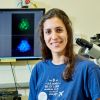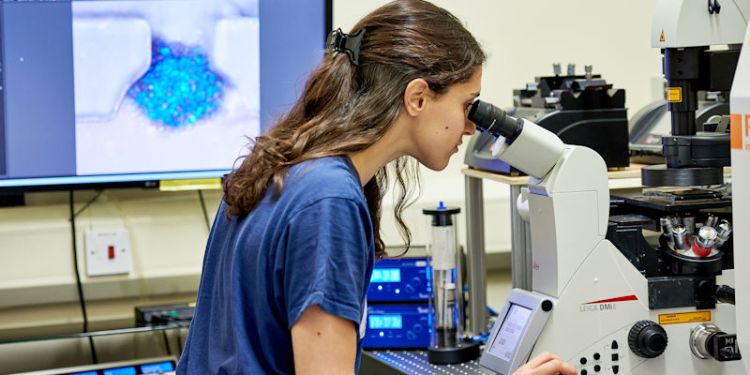
Julia Gala De Pablo
- Course: Research Assistant (Physics)
- PhD title: Biochemical phenotyping of live single cells using confocal Raman spectroscopy
A chance to tackle real problems and experience different cultures
Julia Gala De Pablo, a postgraduate researcher from Madrid, was inspired to pursue her PhD at Leeds after studying at the University for her year abroad. Her current research is based around using microbubbles and ultrasound to test bacterial biofilm disruption, in order to investigate gum disease.
She said:
“I had a great experience at the University of Leeds as an Erasmus student so I decided to apply for a PhD here. As part of the Erasmus scheme I got the chance to do a summer project with my current supervisor, Professor Steve Evans, whose research is in the interface between physics and biology.
“When he proposed my PhD project joining Raman, single-cell biology and microfluidics, I was drawn to it straight away. I enjoyed the science and the work environment. I have loved my PhD experience here.”
Using microbubbles to gain insight into gum disease
After working with Professor Steve Evans on her research project during the exchange programme, Julia is carrying out her PhD research under his supervision. She is developing a new platform which will allow her to test biofilms-on-a-chip to prevent antimicrobial resistance. She said:
“My current research will develop a platform for biofilms-on-a-chip, which will unlock future experiments for testing different antimicrobials on biofilms in a very controlled manner. In particular, my current system is on oral biofilm that causes gum disease.
“Studying the microbubbles interaction with the biofilm could allow future treatment of patients using microbubbles and ultrasound. This will minimize the use of antimicrobials and thus the development of antimicrobial resistance.”

Raman spectroscopy on-a-chip is a label-free technique that allows obtaining the chemical composition of a sample without destroying it using a laser.
She continued:
“My current research project is funded by University of Leeds Alumni. I am making a microfluidic platform for on-chip multi-bacterial biofilm growth, to study the potential of microbubbles for bacterial biofilm disruption using ultrasound. I will also be studying the biofilm using Raman spectroscopy on-a-chip, a label-free technique that allows obtaining the chemical composition of a sample without destroying it using a laser.
Evans’ group is leader in microbubbles for therapeutic applications, and here we want to use ultrasound to explode the microbubble, breaking the biofilm to make it more accessible to other antimicrobial agents.
She added:
“I believe microfluidics is the future to miniaturize the way we do science. Raman spectroscopy and microfluidics hold great potential, and I am really enjoying exploring this research area.
“Additionally, this project has a multidisciplinary approach, so I can work in the interface between biology and physics. Research allows me to push myself every day and learn new things while solving new problems.”
Growing in independence
Julia described how her discoveries have allowed her to grow intellectually and as a person. She said:
“Understanding why we do what we do is essential to become an independent researcher, keeping always in mind the final goal of your project. Science can be a bit frustrating sometimes – if it was easy it wouldn’t be research. Planning the experiments ahead is essential. We try to do lab work in the morning or during the day (9 to 5), and then do analysis in the breaks between experiments or in the afternoon.
“Having a day of the week for reading some literature is also useful. A lot of PhD students work in the same office which makes it a good place to discuss your science with someone with a different background. Also, there is always time for a tea break.”
She continued:
I am currently part of the Molecular and Nanoscale Physics group. In a research position, one of the main skills you train is independent learning – in general, you just become better at learning new things really quickly.
“You also learn to work as part of a team and how important collaboration is in multidisciplinary science. You learn to think out of the box and be more critic with both what other people publish and your own work. Learning during a PhD is mostly through mentoring – either by your supervisors, or more senior researchers. As well, the School of Physics and Astronomy and the University have available courses to complement your learning.”
Leeds’ supportive global community
Julia explains how Leeds has an inclusive community for postgraduate researchers, which makes it easy to settle in. She said:
“My supervisors have always mentored me and helped me become an independent researcher. This sometimes means letting me make my own mistakes and learning from them, or having a chat over a coffee about my career prospects, or proofreading my first fellowship applications.
“My interest in single cell biology, photonics and microfluidics have a good fit with my current research group, giving me access to state of the art facilities and expert advice.”
She added:
“Leeds is a great University to do research, in a vibrant international environment where collaboration between schools and research groups is the rule.
It’s clear that the University is committed to promoting equality and inclusion across campus and has made my PhD experience, as a female and international research scientist, one of the best years of my life.

